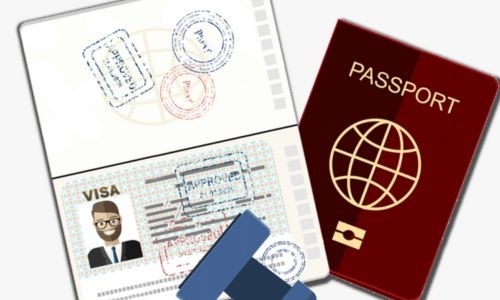A 40-year-old Bahraini man is accused of colluding with a fugitive in Iran to fraudulently renew his passport, a case that has attracted significant attention in the High Criminal Court. The defendant denies the allegations, which include forging passport stamps and extending the passport’s validity for multiple years while living in Iran. The unfolding legal drama involves two defendants, with one fugitive accused of forging signatures and stamps from the General Directorate of Nationality, Passports, and Residence Affairs (NPRA) to create a counterfeit Bahraini passport. The second defendant, the 40-year-old man, is accused of providing his passport and personal details to the fugitive to facilitate the forgery and presenting the fraudulent passport to officials with full knowledge of its illegitimacy.
The defendant was apprehended at Bahrain International Airport after his expired passport was discovered, revealing his collaboration with the fugitive to renew it, despite knowing both the fugitive’s criminal background and his own outstanding warrants. Investigations revealed that the fugitive ran a consultancy in Iran specializing in forging passport stamps and signatures for Bahraini nationals wanted by law enforcement. Additionally, it was found that the defendant’s father had previously submitted an online application for a passport replacement, which was rejected due to non-compliance with regulations. Furthermore, in February 2023, the defendant obtained a transit visa from the Bahraini embassy in the UAE, adding to the complexity of the case.
Prosecution in the case presented key evidence, including testimony from a passport specialist who identified signs of tampering on the defendant’s passport and confirmed that the extensions were invalid. A senior official also confirmed that passport extensions for citizens outside Bahrain must be processed through official embassies or consulates, not through unofficial channels. Forensic analysis verified that the passport stamps in question were entirely fabricated. The High Criminal Court has adjourned proceedings until November 12, giving the defense attorneys time to review the evidence and prepare their case. The defense attorneys, Najla Ali Baqer and Hawra, are tasked with constructing a strong defense strategy for their client in this complex legal battle.
The accused Bahraini man faces serious allegations of conspiring with a fugitive to fraudulently renew his passport, implicating him in a significant legal quandary. The case involves intricate details of forgery, collaboration with a criminal fugitive, and blatant misuse of official documents. The defendant’s denial of the charges sets the stage for a high-stakes legal battle in the High Criminal Court, where the prosecution’s evidence and witness testimonies are crucial in establishing his guilt. The involvement of a consultancy in Iran specializing in forging passport stamps and signatures adds a layer of complexity to the case, showcasing the extent to which individuals go to manipulate official documents for personal gain.
The accused’s decision to seek the assistance of a fugitive with a criminal background to renew his passport raises questions about his judgment and involvement in illegal activities. The revelations of his father’s failed attempts to secure a passport replacement and the defendant’s efforts to obtain a transit visa from the Bahraini embassy in the UAE further complicate the narrative, shedding light on a series of questionable decisions leading to his arrest. The use of forensic analysis to confirm the fraudulent nature of the passport stamps and the invalidity of the extensions highlights the meticulous investigative work undertaken in unraveling the conspiracy orchestrated by the defendants.
With the defense attorneys granted additional time to review the evidence and build their case, the legal battle is poised to intensify as both sides prepare their arguments for the upcoming court proceedings. The prosecution’s reliance on expert testimonies and official regulations governing passport extensions strengthens their case against the accused, leaving little room for doubt regarding his complicity in the fraudulent scheme. As the High Criminal Court reconvenes to address the complexities of the case, the defense attorneys face the daunting task of challenging the prosecution’s evidence and presenting a convincing defense strategy to exonerate their client. The outcome of this legal saga will ultimately hinge on the court’s interpretation of the evidence presented and the credibility of the defense’s arguments in the face of serious criminal charges.











